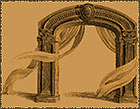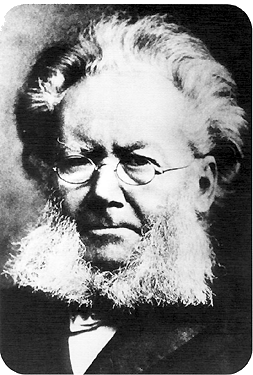

  |
|
|
||
 |
||
|
Henrik Johan Ibsen 1828 - 1906 |
|
Henrik Johan Ibsen (1828-1906) was an influential
Norwegian playwright who was largely responsible for the rise of the
modern realistic drama. It is said that Ibsen is the most frequently
performed dramatist in the world after Shakespeare. His plays were considered
scandalous to many of his era, when Victorian values of family life
and propriety largely held sway in Europe and any challenge to them
was considered immoral and outrageous. Ibsen's work examined the realities
that lay behind many facades, which his society did not want to see.
Ibsen largely founded the modern stage by introducing a critical eye
and free inquiry into the conditions of life and issues of morality.
Victorian-era plays were expected to be moral dramas with noble protagonists
pitted against darker forces. Every drama was expected to result in
a morally appropriate conclusion, meaning that goodness was to bring
happiness, and immorality only pain. Ibsen challenged this notion and
the beliefs of his times and shattered the illusions of his audiences.
He was born to Knud Ibsen and Marichen Altenburg, a relatively well-to-do
merchant family, in the small port town of Skien, Norway, which was
primarily noted for shipping timber. Shortly after his birth, however,
his family's fortunes took a significant turn for the worse. He moved
to the small town Grimstad to become an apprentice pharmacist and began
writing plays. In 1846, he fathered an illegitimate child with a servant
maid that he rejected. Ibsen came to Oslo intending to attend university,
but cast off the idea, preferring to commit to writing. His first play,
the tragedy Catilina (1850), was published under the pseudonym Brynjolf
Bjarme, when he was only 22, but it was not performed. His first play
to see production was The Burial Mound (1850), however, it did not receive
much attention. Still, Ibsen was determined to be a playwright, although
he was not to write again for some years. Ibsen returned to Oslo in
1858 to become the creative director of Oslo's National Theater. He
married Suzannah Thoresen the same year and they gave birth to their
only child, Sigurd. The couple lived in very poor financial circumstances
and Ibsen became very disenchanted with life in Norway. In 1864 he left
Oslo and went to Italy in self-imposed exile. He was not to return to
his native land for the next 27 years, and when he returned it was to
be as a noted playwright, however controversial. With success, he became
more confident and began to introduce more and more his own beliefs
and judgments into the drama, exploring what he termed the "drama of
ideas". His next series of plays are often considered his Golden Age,
when he entered the height of his power and influence, becoming the
center of dramatic controversy across Europe. Ibsen moved to Munich
in 1875 and published A Doll's House in 1879. The play is a scathing
criticism of the traditional roles of men and women in Victorian marriage.
Ibsen followed A Doll's House with Ghosts (1881), another scathing commentary
on Victorian morality, in which a widow reveals to her pastor that she
has hidden the evils of her marriage for its duration. The pastor had
advised her to marry her then fiancÚ despite his philandering, and she
did so in the belief that her love would reform him. But she was not
to receive the result she was promised. Her husband's philandering continued
right up until his death, and the result is that her son is syphilitic.
Even the mention of venereal disease was scandalous, but to show that
even a person who followed society's ideals of morality had no protection
against it, that was beyond scandalous. Hers was not the noble life
which Victorians believed would result from fulfilling one's duty rather
than following one's desires. Those idealized beliefs were only the
Ghosts of the past, haunting the present. In An Enemy of the People
(1882), Ibsen went even further. Before, controversial elements were
important and even pivotal components of the action, but they were on
the small scale of individual households. In An Enemy controversy became
the primary focus, and the antagonist was the entire community. The
Wild Duck (1884) is considered by many to be Ibsen's finest work, and
it is certainly the most complex. It tells the story of Gregers Werle,
a young man who returns to his hometown after an extended exile and
is reunited with his boyhood friend Hjalmar Ekdal. Over the course of
the play the many secrets that lie behind the Ekdals' apparently happy
home are revealed to Gregers, who insists on pursuing the absolute truth,
or the "Summons of the Ideal". Among these truths: Gregers' father impregnated
his servant Gina, then married her off to Hjalmar to legitimize the
child. Another man has been disgraced and imprisoned for a crime the
elder Werle committed. And while Hjalmar spends his days working on
a wholly imaginary "invention", his wife is earning the household income.
Probably Ibsen's most performed play is Hedda Gabler (1890), the leading
female role being regarded as one of the most challenging and rewarding
for an actress even in the present day. There are many similarities
between Hedda and the character of Nora in A Doll's House. Ibsen had
completely rewritten the rules of drama with a realism which was to
be adopted by Chekhov and others and which we see in the theater to
this day. From Ibsen forward, challenging assumptions and directly speaking
about issues has been considered one of the factors that makes a play
Art rather than entertainment. With a stellar career behind him, the
likes of which few authors or playwrights ever see, Ibsen passed away
after a series of strokes in Kristiania in 1906 at the age of 78. He
did particularly well in his last words, with his nurse assuring a visitor
that the playwright was a little better, only for Ibsen to splutter
"On the contrary" - and died. From Wikipedia, the free encyclopedia. |
||
 |
|
|
||
|
© 2005 DJM
Productions, Inc. Dionysus Theatre
Complex ® and The
Dionysus Theater ®
are registered trademarks |